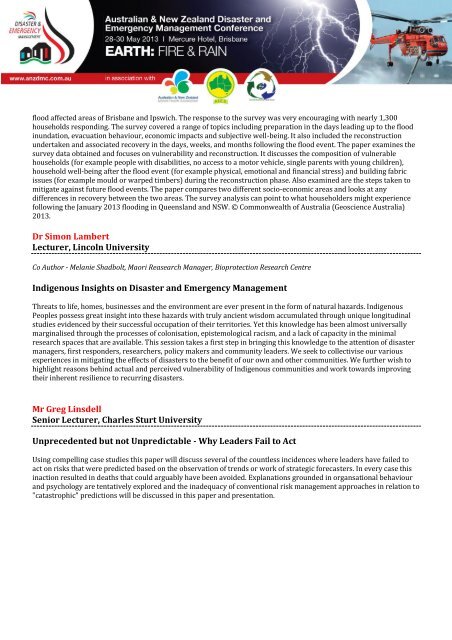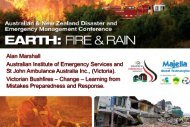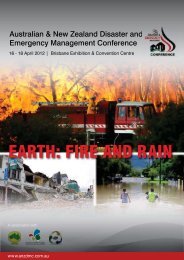Book of Abstracts 2013 - Australian and New Zealand Disaster ...
Book of Abstracts 2013 - Australian and New Zealand Disaster ...
Book of Abstracts 2013 - Australian and New Zealand Disaster ...
Create successful ePaper yourself
Turn your PDF publications into a flip-book with our unique Google optimized e-Paper software.
flood affected areas <strong>of</strong> Brisbane <strong>and</strong> Ipswich. The response to the survey was very encouraging with nearly 1,300<br />
households responding. The survey covered a range <strong>of</strong> topics including preparation in the days leading up to the flood<br />
inundation, evacuation behaviour, economic impacts <strong>and</strong> subjective well-being. It also included the reconstruction<br />
undertaken <strong>and</strong> associated recovery in the days, weeks, <strong>and</strong> months following the flood event. The paper examines the<br />
survey data obtained <strong>and</strong> focuses on vulnerability <strong>and</strong> reconstruction. It discusses the composition <strong>of</strong> vulnerable<br />
households (for example people with disabilities, no access to a motor vehicle, single parents with young children),<br />
household well-being after the flood event (for example physical, emotional <strong>and</strong> financial stress) <strong>and</strong> building fabric<br />
issues (for example mould or warped timbers) during the reconstruction phase. Also examined are the steps taken to<br />
mitigate against future flood events. The paper compares two different socio-economic areas <strong>and</strong> looks at any<br />
differences in recovery between the two areas. The survey analysis can point to what householders might experience<br />
following the January <strong>2013</strong> flooding in Queensl<strong>and</strong> <strong>and</strong> NSW. © Commonwealth <strong>of</strong> Australia (Geoscience Australia)<br />
<strong>2013</strong>.<br />
Dr Simon Lambert<br />
Lecturer, Lincoln University<br />
Co Author - Melanie Shadbolt, Maori Reasearch Manager, Bioprotection Research Centre<br />
Indigenous Insights on <strong>Disaster</strong> <strong>and</strong> Emergency Management<br />
Threats to life, homes, businesses <strong>and</strong> the environment are ever present in the form <strong>of</strong> natural hazards. Indigenous<br />
Peoples possess great insight into these hazards with truly ancient wisdom accumulated through unique longitudinal<br />
studies evidenced by their successful occupation <strong>of</strong> their territories. Yet this knowledge has been almost universally<br />
marginalised through the processes <strong>of</strong> colonisation, epistemological racism, <strong>and</strong> a lack <strong>of</strong> capacity in the minimal<br />
research spaces that are available. This session takes a first step in bringing this knowledge to the attention <strong>of</strong> disaster<br />
managers, first responders, researchers, policy makers <strong>and</strong> community leaders. We seek to collectivise our various<br />
experiences in mitigating the effects <strong>of</strong> disasters to the benefit <strong>of</strong> our own <strong>and</strong> other communities. We further wish to<br />
highlight reasons behind actual <strong>and</strong> perceived vulnerability <strong>of</strong> Indigenous communities <strong>and</strong> work towards improving<br />
their inherent resilience to recurring disasters.<br />
Mr Greg Linsdell<br />
Senior Lecturer, Charles Sturt University<br />
Unprecedented but not Unpredictable - Why Leaders Fail to Act<br />
Using compelling case studies this paper will discuss several <strong>of</strong> the countless incidences where leaders have failed to<br />
act on risks that were predicted based on the observation <strong>of</strong> trends or work <strong>of</strong> strategic forecasters. In every case this<br />
inaction resulted in deaths that could arguably have been avoided. Explanations grounded in organsational behaviour<br />
<strong>and</strong> psychology are tentatively explored <strong>and</strong> the inadequacy <strong>of</strong> conventional risk management approaches in relation to<br />
"catastrophic" predictions will be discussed in this paper <strong>and</strong> presentation.






